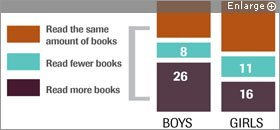Children are embracing e-books by the millions, but most say they still would choose the printed version, according to a survey released last week.
Scholastic’s biennial survey of 6- to 17-year-olds found e-books soaring in popularity: Forty-six percent of the 1,074 children said they had read an e-book, compared with 25 percent who said they had in 2010.
The e-book-reading numbers vary by only a few percentage points by gender or age group. But boys were slightly more likely to say that since they started reading e-books, they’re reading more books overall.
Half the young people said they’d read more books for fun if they had better access to e-books. And it’s clear that those surveyed are doing the lion’s share of e-book reading at home, rather than in school: Three-quarters of the respondents who have read an e-book have done so at home; only one-quarter said they had read an e-book in school.
Among children who have read an e-book, one in five says he or she is reading more books for fun, especially boys.

Note: Figures may not add up to 100 percent because of rounding.
SOURCE: Scholastic
E-books are particularly good when students are traveling or on the go, they told researchers, or when they don’t want their friends to know what they’re reading.
The survey for the New York City-based educational publisher was conducted online last fall. Questions were put to a nationally representative sample of 2,048 people, including children ages 6 to 17 and their parents.
No Batteries Required
But print books clearly still have a big place in children’s lives. Their responses showed that 80 percent of the books they read for fun are in print. They also prefer the printed form over the e-book for reading at bedtime or sharing with friends, the study found.
Fifty-eight percent said they will always want to read books printed on paper even if e-books are available. Two-thirds of the young people surveyed by Scholastic in 2010 gave the same response.
Asked about the benefits of e-books, children and parents most frequently cited the convenience of carrying all their books around in one place and obtaining books wherever they are. Among the e-book attributes they like the most are dictionaries, built-in note-taking and highlighting features, and skill-building activities.
Print books, on the other hand, got high marks from children and parents for not needing batteries and for the ease of seeing how much of a book has been read. Children, in particular, cited liking to hold a print book more than an electronic device. Parents cited liking to “get away from technology.”






